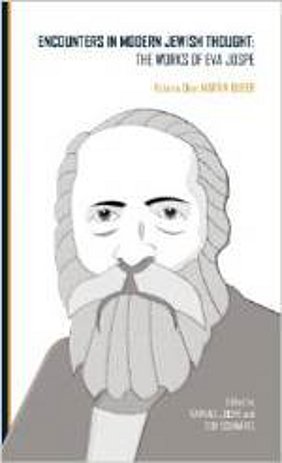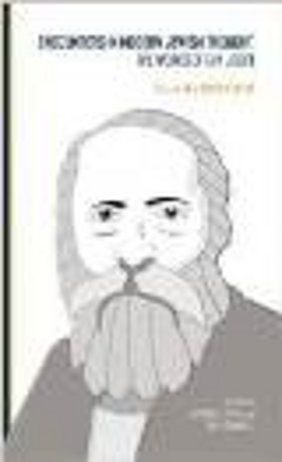Eva Jospe (1913-2011) was a German Jewish refugee and émigré, a younger member of the generation of Alexander Altmann and Nahum Glatzer. She taught at Georgetown and George Washington University, and released popular and enduring translations of figures like Hermann Cohen, Franz Rosenzweig, and Martin Buber. However, her education had been interrupted by the Nazi rise to power (her husband Alfred was arrested on Kristallnacht and briefly interned) and her emigration, and by the time she completed her MA degree she was a woman of fifty. Perhaps as a result, her stature and reputation never reached the heights of her male colleagues (as far as I can tell, she still does not even have her own Wikipedia page). Her son Raphael Jospe, in collaboration with Dov Schwartz and several other members of the Jospe family, has attempted to remedy this situation with a new three-volume edition of Jospe’s work on central modern Jewish thinkers, entitled Encounters in Modern Jewish Thought: The Works of Eva Jospe.
Of the three volumes, it is volume 1 (dealing with Buber) and volume 2 (dealing with Moses Mendelssohn) that contain the material likeliest to be new to scholars of modern Jewish thought. Volume 3, on Cohen, is largely a reprint of Jospe’s Reason and Hope: Selections from the Jewish Writings of Hermann Cohen (1971), a text which in its edition from Hebrew Union College Press has for a long time stood alongside Simon Kaplan’s translation of the Religion of Reason: Out of the Sources of Judaism (1995) as one of the only editions of Cohen’s writings available in English (though this is expected to be remedied soon with the release of a new edition of Cohen’s writings from Brandeis’ Library of Modern Jewish Thought series).
Like the other refugees of her generation, Jospe wrote not just as a scholar of German Jewish thought, but as a representative of its spirit (Geist). Old enough to have studied with Buber, though too young to have studied with Cohen, she took it upon herself to educate American students about the thread of German Jewish thought that began with Mendelssohn and ended in her own time. A 1980 essay of hers on this subject, entitled “Teaching Modern Jewish Thought,” is included in the Buber volume, and provides an interesting window into Jospe’s conviction that “Judaism’s religio-cultural tradition and its modern interpretation can … say much that is urgently needed to an age (‘age’ in the double sense of an era and of a stage in an individual’s life) undergoing the stress and strain of transvaluing all values” (pp. xxxiv-xxxv). This conviction is balanced against Jospe’s firm belief that proselytization does not belong in the classroom; her only “conversional intent” is to turn her students “from indifference to matters of the mind toward a concern with them” (p. xxxviii).
The editors of the volume maintain a somewhat awkward position towards their subject in respect of these convictions. As mentioned above, the new series is something of a family affair, and as such a labor of love. Its goal is to re-present Jospe’s work and by doing so to raise her profile. There is nothing inherently untoward about this goal, although it does occasionally result in odd formulations, as when Raphael Jospe in his preface paraphrases his mother’s conclusion at the end of her Mendelssohn study, that “even if we do not agree with all of his ideas, without his intellectual accomplishments and the example of his life, we would not be who we are today--proud and loyal Jews and citizens of modern culture” (pp. xi-xii). The free use of “we” here seems intended to include all those who might consider themselves, like Eva Jospe herself, to be inheritors of the tradition she is transmitting, rather than those who consider themselves merely interested observers, or even bound to the task of critical analysis from a presumed standpoint as an outsider.
This is not to say that there is no dissonance in these volumes. In her master’s thesis, “The Concept of Encounter in the Philosophy of Martin Buber,” which takes up the lion’s share of volume 1, Jospe criticizes Buber frequently and occasionally sharply. Whether it relates to his account of the I-Thou relation between human beings and inanimate objects (Jospe logically queries how we can know anything about the reciprocity and mutuality of such a relation), to his theodicy of the “eclipse of God” (can it do justice to those who are killed during the eclipse, and thus never live to see the return of the sun?) to elements of his philosophy of education (too lax on principled moral instruction), or even to his writing style (too effusive and insufficiently rigorous), Jospe is clearly willing to raise her own voice in objection.
Many of her criticisms, in fact, would become standard objections in the mid-century literature, and it would be interesting to attempt to trace the intellectual impact of Jospe’s work--for example, on Maurice Friedman, the most prominent translator and popularizer of Buber for American audiences, and to whose unpublished manuscript on Martin Buber’s Life and Thought Jospe had access during the writing of her thesis (suggesting a friendly correspondence). Friedman’s Martin Buber: The Life of Dialogue had already been published in 1955, as Ephraim Meir notes in his introduction to our volume, as had early assessments by Will Herberg, Arthur A. Cohen, Eliezer Berkovits, and Malcolm L. Diamond. But with Buber still alive and much of his work still unavailable in English, Jospe’s work nevertheless belongs to the early period of his Anglophone reception, and will have to be included in any future estimations of his mid-century intellectual impact.
Despite her German origins, Jospe’s work is in many ways typical of the mid-century American reception of Buber. This trend takes the dialogical philosophy to be Buber’s major contribution as a thinker, and understands it to form an existentialist statement that can compete for the loyalty of currently lived lives, offering an alternative to Jean-Paul Sartre and Martin Heidegger. Buber’s socialism and binationalism are mentioned, but seen as epiphenomena or applications of the philosophy of dialogue to social questions. A more critical, historically minded editorial apparatus might have attempted to place these approaches into their Cold War context, treating Jospe as primary literature in her own right rather than just as a potentially helpful commentator on Buber.
In addition to Raphael Jospe’s biographical preface and Meir’s introduction, and besides the MA thesis and the essay on teaching modern Jewish thought, the volume contains two other short pieces by Jospe herself: a reprinted 1978 article from the journal Judaism entitled “Encounter: The Thought of Martin Buber,” largely recapitulating the conclusions of the MA thesis and included here as part of the prefatory material, and a short sermon, “Kristallnacht Remembered,” given in Washington, DC, on the fiftieth anniversary of that event. The text is rather oddly placed after the preface and before the introduction, but one can see why the editors included it despite its having nothing to do with Buber, Mendelssohn, or Cohen. It is a powerful personal account of Jospe’s own experiences, a defense of those Jews who remained in Germany between 1933 and 1938, and a call to the task of remembering the dead. When she describes the process of identifying with the six million as an approximation of the rabbinic appellation of God as Mechaye Hametim, “giving life to the dead,” one gets a sense of what Eva Jospe’s relation was to the German Jewish intellectual tradition as well.



